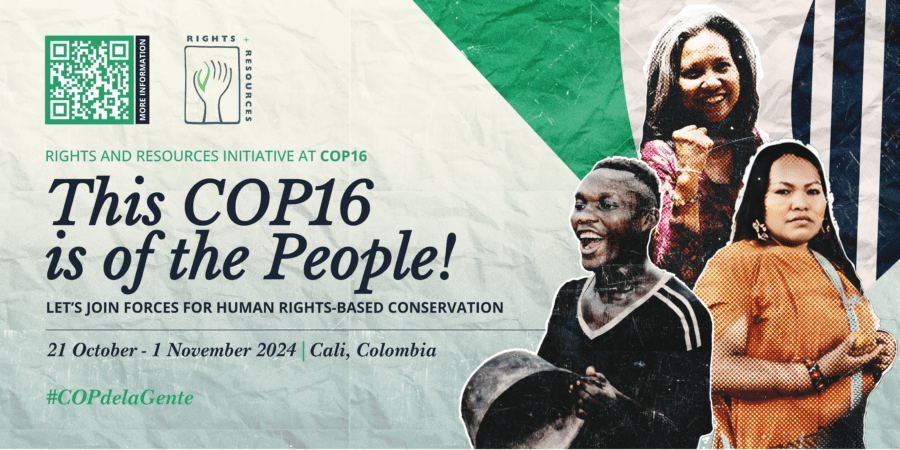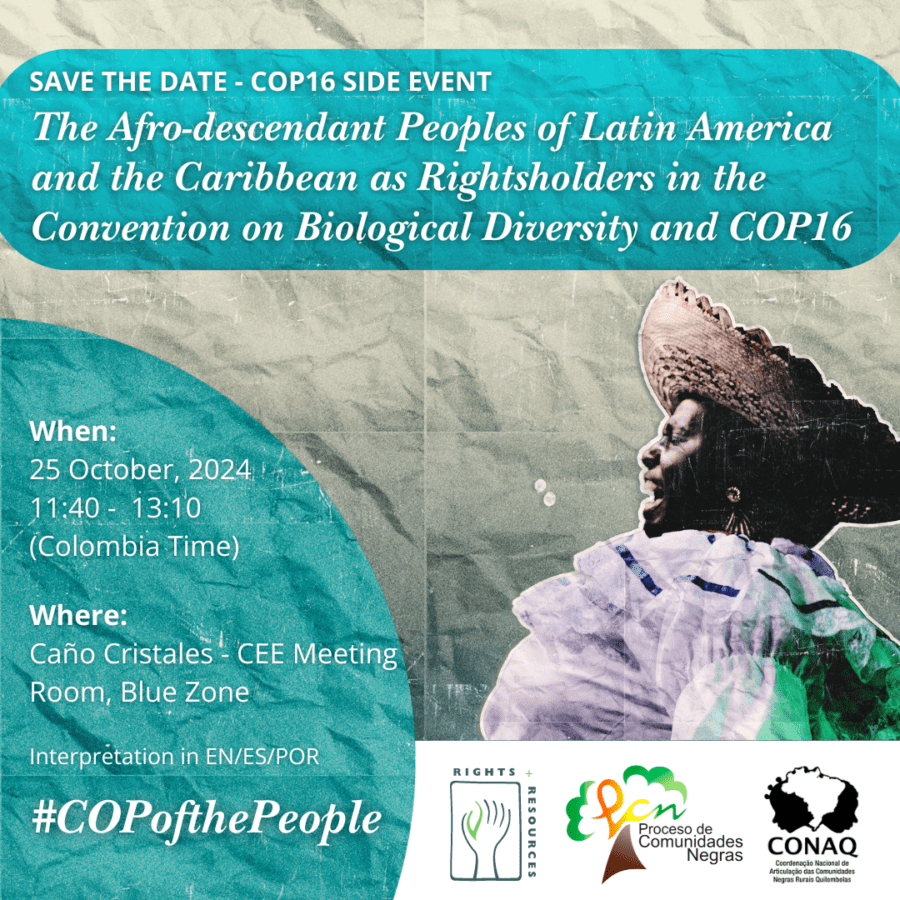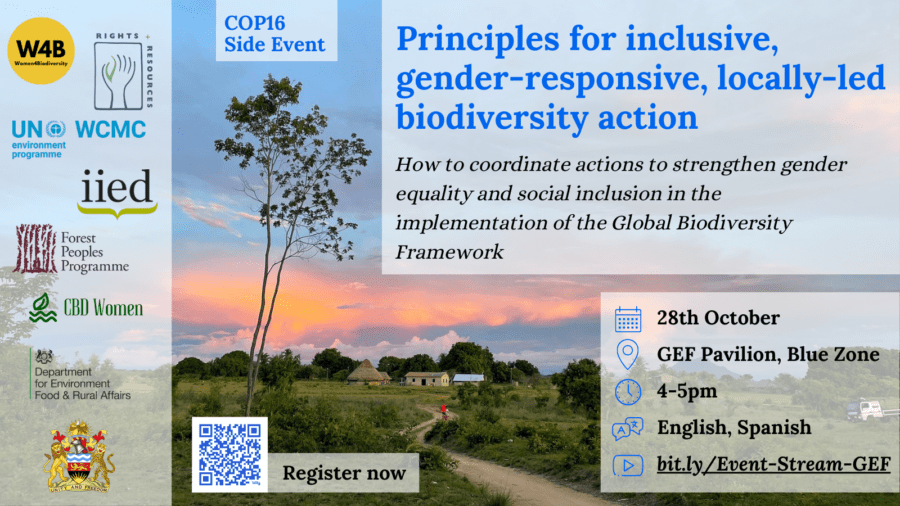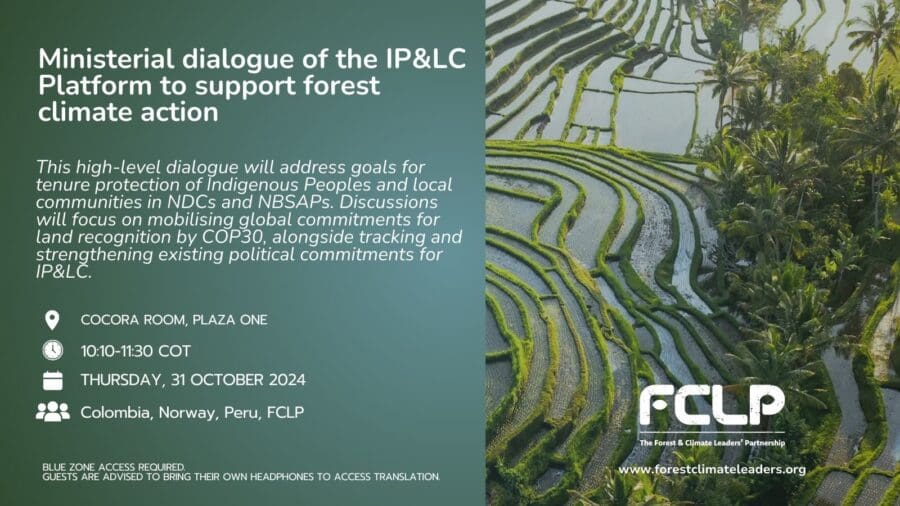RRI Engagements at CBD COP16
Date: 10/21/2024 - 11/01/2024
Nom de la localisation: Cali, Colombia
Welcome to RRI’s COP16 agenda! Every two years, the Conference of the Parties to the Convention on Biological Diversity (CBD) offers a chance for people, institutions, and governments to come together to discuss global challenges and opportunities to conserve nature and protect the planet. This year, that event (CBD COP16) is taking place in Cali, Colombia from October 21 to November 1, 2024.
There are high expectations for countries to deliver on their Global Biodiversity Framework commitments and share their updated National Biodiversity Strategies and Action Plans to achieve a global vision of a world living in harmony with nature. COP16 is an important opportunity to advance rights-based conservation approaches and recognize the vital role that Indigenous Peoples, local communities, and Afro-descendant Peoples—especially the women and youth within these groups—play in safeguarding biodiversity.
Here is a list of RRI’s planned events and speaking engagements at COP16. More events will be added as they become available, so check back often!
All times and locations are local to Colombia (GMT-5). Events are listed chronologically and event registration/live stream access is included when applicable.

October 22, 2024
Women’s Voices on Rights-based Conservation: The Role of Indigenous, Afro-descendant, and Pastoralist Women in Protecting the World’s Biodiversity
When: 10:00 a.m. – 11:30 a.m. (GMT-5)
Where: Afro Pavilion, Plaza 3, Blue Zone
Hosts: Rights and Resources Initiative, International Institute for Environment and Development, Organización Nacional de Mujeres Indígenas Andinas y Amazónicas del Perú, Asociación de Mujeres del Norte del Cauca
What: This side event addresses the crucial roles that Indigenous, Afro-descendant, and local community women play in conserving natural resources and in climate change action. It will present the strategies that the Women in Global South Alliance for tenure and climate (WiGSA) is developing to (i) respond to the dual biodiversity and climate crises; (ii) transform the structural gender-based discrimination and exclusion that renders women’s leadership invisible; and (iii) shine a light on the inequalities women experience that limits their right to participate in decision-making spaces.
Rights and Resources Initiative (RRI) will present the preliminary results from bottom-up scoping research that seeks to identify how climate change and conservation funding is reaching Indigenous, Afro-descendant, and local community women’s efforts on the ground and whether this funding responds to their rights-based agendas. The International Institute for Environment and Development will discuss case studies from Sub-Saharan Africa and Latin America to provide empirical examples of how women from marginalized communities are affected by and respond to the climate crisis and inequality.
Overall, the event will highlight the need to ensure that Indigenous, Afro-descendant, and local community women receive direct financial and technical support to strengthen their efforts on the ground.

How: Attendance is free
Framework Presentation: Omaira Bolaños, Rights and Resources Initiative (RRI), United States
Moderator: Maria DiGianno, Moore Foundation
Panel Discussion
- Ketty Marcelo, Organización Nacional de Mujeres Indígenas Andinas y Amazónicas del Perú (ONAMIAP-WiGSA), Peru
- Clemencia Carabali Rodallega, Asociación de Mujeres Afrodescendientes del Norte del Cauca (ASOM-WiGSA), Colombia
- Bharati Pathak, Women’s Rights and Resource Network (WRRN-WiGSA), Nepal
- Mina Beyan, Social Entrepreneurs for Sustainable Development (SESDev-WiGSA), Liberia
- Sara Omi, Coordinadora de las Mujeres Líderes Territoriales de Mesoamérica (CMLTM-WiGSA), Panama
October 23, 2024
Role of Women in Community Forest for Restoration
When: Time TBD
Where: Women’s Hub Pavilion, Blue Zone
Hosts: Rights and Resources Initiative, FECOFUN
What: More information coming soon
How: Attendance is free
October 24, 2024
Navigating a Changing World with Human Rights at the Core: Implementing the Kunming-Montreal Global Biodiversity Framework with a Human Rights-Based Approach
When: 11:40 a.m. – 1:10 p.m. (GMT-5)
Where: Sinu – Africa meeting room, Plaza One, and virtually
Hosts: RRI, ICCA Consortium, IUCN CEESP, UNEP, W4B, FPP, ICCA GSI, WCPA, SwedBio, IIED, WGII, KV, CENESTA, OC, Shanshui, SSCC, ANAPAC
What: This side event will explore the intersection of human rights and biodiversity conservation in the context of the 30×30 target within the Kunming-Montreal Global Biodiversity Framework. Through the presentation of cutting-edge research, key case studies, and practical examples, the event will delve into the challenges and opportunities faced by Indigenous Peoples and Local Communities when leading rights-based conservation efforts. A specific focus will be placed on the newly launched Core Human Rights Principles for Conservation Actors and their role in ensuring equity and justice in biodiversity conservation. This side event also coincides with the launch of a new study by Rights and Resources Initiative, in collaboration with the Forest Peoples Programme, the ICCA Consortium, and their partner organizations worldwide. The study delves into the enabling conditions for rights-based conservation within the 30×30 framework.
How: Attendance is free in person and virtually
October 25, 2024
The Afro-descendant Peoples of Latin America and the Caribbean as Rightsholders in the Convention on Biological Diversity and COP16
When: 11:40 a.m. – 1:10 p.m. (GMT-5)
Where: Caño Cristales, CEE meeting room, Plaza One
Hosts: Rights and Resources Initiative, Proceso de Comunidades Negras, Coordenação Nacional de Articulação das Comunidades Negras Rurais Quilombolas
What: Afro-descendant Peoples are an integral part of the history and the economic, political, and social processes of nation-building and development in Latin America and the Caribbean. National censuses estimate that 21% of the total population, or 154 million people, self-identifies as Afro-descendant.
This side event will debate the applicability of the principles of accessibility, affordability, adaptability, and acceptability to guarantee equal rights for Afro-descendant Peoples, including attaining a Voice and Vote within the CBD and UNFCCC. The panel will also be a space to demonstrate Afro-descendant Peoples’ contributions to the fulfilment of the Kunming-Montréal Global Biodiversity Framework and present the first Afro-descendant Atlas, as well as the most recent data collected by the Afro-descendant coalition that show the status of their territorial presence and their contributions to biodiversity conservation in 16 countries in Latin America and the Caribbean.

How: Attendance is free
Framework Presentation: Jose Luis Rengifo, Proceso de Comunidades Negras (PCN), Colombia
Moderator: Omaira Bolaños, Rights and Resources Initiative, RRI, United States
Panel Discussion:
- Elias Helo, Observatorio de Territorios Etnicos y Campesinos, Javeriana University (OTEC), Colombia
- Katia Penha, Coordenação Nacional de Articulação das Comunidades Negras Rurais Quilombolas (CONAQ), Brazil
- Clemencia Carabali, Asociación de Mujeres Afrodescendientes del Norte del Cauca (ASOM), Colombia
- Richard Moreno, Consejo Nacional de Paz Afrocolombiano (CONPA), Colombia
- Dario Solano, Red Dominicana de Estudios y Empoderamiento Afrodescendiente (REDAFROS), Dominican Republic
October 28, 2024
The DRC at the Forefront of Implementation of Target 3 of the Kunming Global Biodiversity Framework Montreal for Biodiversity: National Strategy for Nature Conservation Outside Protected Areas, Progress, and Prospects
When: 1:20 p.m. – 2:20 p.m. (GMT-5)
Where: Sinu – Africa meeting room, Plaza One
Hosts: Rights and Resources Institute, Ministry of Environment and Development, ANAPAC RDC, BEF, Rainforest Norway, IUCN, IIFB, hac, MEDD-RDC
What: This side event will promote the exchanging of ideas necessary to achieve the goals of the Kunming-Montreal Global Biodiversity Framework, particularly targets 2 and 3, while raising awareness of the feasibility of rights-based approaches from the National Conservation Strategy Outside Protected Areas, launched in April 2024. This strategy relies on the recognition and integration of the important roles and contributions of Indigenous Peoples and local communities as custodians of biodiversity and partners in the conservation, restoration, and sustainable use of nature, whether in the Democratic Republic of Congo or elsewhere.
How: Attendance is free

Principles for Inclusive, Gender-Responsive, Locally-led Biodiversity Action
When: 4:00 p.m. – 5:00 p.m. (GMT-5)
Where: Gef Pavilion, Blue Zone
Hosts: Rights and Resources Institute, UK government, Government of Malawi, International Institute for Environment and Development, CBD Women’s Caucus, Women4Biodiversity, UNEP-WCMC, Forest Peoples Programme
What: The purpose of this event is to launch the new principles for inclusive, locally-led, gender-responsive biodiversity action agreed upon at a UK government-sponsored conference in September of 2024. The principal focus is to help co-ordinate actions to strengthen the gender equality and social inclusion updates necessary to implement the Kunming-Montreal Global Biodiversity Framework and tackle the biodiversity crisis.
How: Attendance is free

October 29, 2024
COP16 30×30 Action Day: Third Roundtable and Closing Event
When: 2:30 p.m. – 3:30 p.m.; 4:00 p.m. – 5:30 p.m. (GMT-5)
Where: GBF Pavilion, Blue Zone
What: 30×30 Action Day will gather world leaders, policymakers, financial leaders, and influential partners from across the globe to review the progress of target 3 in the Kunming Montreal Global Biodiversity Framework, also known as 30×30. This target calls for the protection and conservation of at least 30% of the planet’s land and ocean by 2030.
RRI will take part in the third roundtable of the day, called “The recognition of traditional territories and respect of the rights of IP&LCs.” It will consist of a panel discussion where participants will talk through how to better position themselves to contribute to the 30×30, how to implement the roadmap to rights and equity, and the role of policy makers and conservation organizations to support Indigenous Peoples and local community groups.
RRI will also take part in the high-level closing session, where participants of each roundtable discussions will provide a short summary of recommendations based on the discussions that were had throughout the day.
How: Attendance is free.
October 30, 2024
Direct Financing to Indigenous Peoples and Local Communities as a Mechanism
to Achieve the Goals of the Glasgow Declaration and the Global Biodiversity Framework
When: 6:15 p.m. – 7:45 p.m. (GMT-5)
Where: Peru Pavilion, Blue Zone
What: The aim of this event is to discuss proposals from Indigenous Peoples to achieve the goals set in the Glasgow Leaders’ Declaration on Forests and Land Use, as well as the Kunming-Montreal Global Biodiversity Framework. It will also cover progress made by the Government of Peru in these areas and explore international opportunities for political action, climate funding, and biodiversity financing to address the needs and initiatives of Indigenous territories and local communities.
How: Attendance is free
Panel Discussion
- Solange Bandiaky-Badji, Coordinator, Rights and Resources Initiative
(RRI) - Juan Carlos Jintiach, Executive Secretary, Global Alliance of Territorial
Communities (GATC) - Gustavo Sánchez, Secretary, Alianza Mesoamericana de Pueblos y
Bosques (AMBP) - Casey Box, Director of Global Strategy, Christensen Fund
- Leif John Fosse, Senior Advisor, Norway’s International Climate and Forest
Initiative (NICFI) - Sarah Amy Wyatt, Senior Biodiversity Specialist, Global
Environmental Fund (GEF)
October 31, 2024
Ministerial Dialogue of the Indigenous Peoples and Local Communities Platform to Support Forest Climate Action
When: 10:10 a.m. – 11:30 a.m. (GMT-5)
Where: Plaza One, Subnational and Local Authorities Room, Blue Zone
Hosts: Rights and Resources Initiative, Colombia Government, Norway Government, Peru Government, FCLP
What: Both the Glasgow Leaders Declaration and the target 1 and target 3 of the Global Biodiversity Framework will not be achieved without protecting Indigenous Peoples and Local Communities territories, their biodiversity, cultures, and traditional knowledge. Representatives from 14 governments (including Norway and Peru), the Global Alliance for Territorial Communities, and a variety of philanthropic funders launched the Platform to Support Indigenous Peoples and Local Communities in Forest Climate Action at COP28 in 2023. According to the platform, they agreed to: « increase high-level political attention on IP and LC issues raised by IP and LC organizations and FCLP country members, utilizing regional and geopolitical opportunities to influence decision-making and political (including donor) agendas. »
How: Attendance is free

